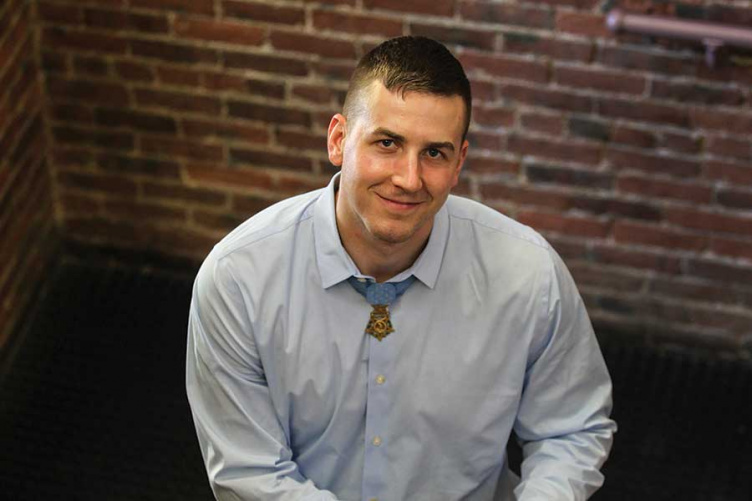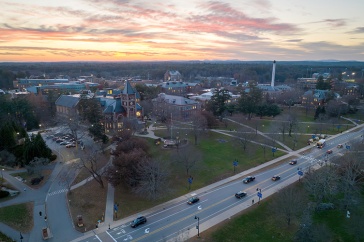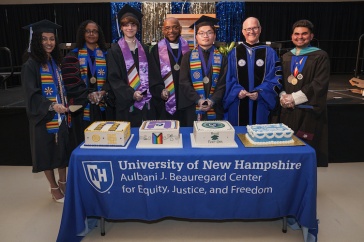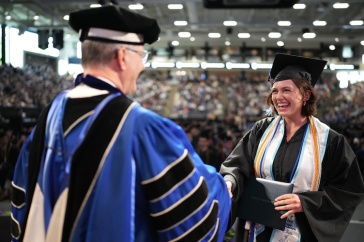
As he strode toward the White House stage on a late July afternoon, Army Staff Sergeant Ryan Pitts ’13 looked every inch the soldier: eyes front, shoulders back, dress uniform decked with ribbons, knife-crease trousers tucked into polished boots. In just a few minutes President Barack Obama would present him with the Medal of Honor, “for extraordinary acts of heroism at the risk of his life above and beyond the call of duty.” The nation’s highest military honor, it had been awarded just 16 times over the course of the Iraq and Afghanistan wars.
Yet the way Pitts saw it, he was far from alone on that stage. “The Medal of Honor,” he says a few weeks after the ceremony, “is an individual award for a collective effort.”
At ease, Pitts’ face relaxes into the kind of boyish grin that makes people around him beam right back. Tall and broad-shouldered, a slight limp the only trace of the injuries that confined him to Walter Reed Army Medical Center for many months, he exudes the easy warmth that endeared him to faculty and classmates at UNH Manchester, where he enrolled following his medical discharge from the army. Now 29 and a business development consultant for the Oracle Corporation, he lives in Nashua with his wife, Amy, a mortgage processor, and their 18-month-old son, Lucas.
Yet his affable face snaps quietly to attention when he talks about a far different July day, near the end of his second deployment to Afghanistan with the 173rd Airborne Brigade. In the predawn hours of July 13, 2008, his 48-man unit and members of the Afghan National Army were attacked by a group of 200 insurgents near the tiny village of Wanat in remote Kunar Province. The battle of Wanat was, in the president’s words, “one of the most fierce of this entire war.” In the space of just a few hours, nine men were killed, and 27 wounded.
“There was,” Pitts says simply, “valor everywhere.” It was essential to him that the credit for it be shared.
And so the East Room of the White House was filled to capacity with other soldiers, not just past recipients of the Medal of Honor, but also, at Pitts’ express invitation, the paratroopers he served with in Kunar Province, along with the medevac team that airlifted him out of Wanat. Directly in front of Pitts were the Gold Star families, relatives of the men who fought alongside him that day and died: Specialist Sergio Abad, Corporal Jonathan Ayers, Corporal Jason Bogar, 1st Lieutenant Jonathan Brostrom, Sergeant Israel Garcia, Corporal Jason Hovater, Corporal Matthew Phillips, Corporal Pruitt Rainey and Corporal Gunnar Zwilling.

“We grew up together in the army,” Pitts says of the men he served with. “We were privates together when we trained for our first deployment, and by the second deployment we were all in leadership positions within the same company, many within the same platoon.” They were, in short, a family. On that fateful morning they fought for country, to be sure, but they also fought for each other.
Ours, Not Mine
As President Obama described the battle, the men’s valor became palpable. For a few minutes the pomp-filled East Room became the sandbag observation post where Pitts and a handful of other soldiers—most of them injured during the first barrage of machine-gun fire and rocket-propelled grenades—sought to hold off the insurgents and prevent them from overrunning the main base below. With shrapnel injuries to his left arm and both legs, Pitts was among the critically wounded. His left Achilles tendon was partially severed, and he was losing blood badly from deep lacerations to his right leg that traveled all the way up to his lower back. Yet, as the president recounted, “Ryan picked up a grenade, pulled the pin, and held that live grenade—for a moment, then another, then another—finally hurling it so they couldn’t throw it back.” Again and again, Pitts held the “cooked-off” grenades and threw them; between throws, he called in situation reports to the company commander in the base below. Then, to conserve grenades, he switched to a machine gun and returned fire, even though he could no longer stand.
When asked what he remembers most about the battle, it’s not his own actions or injuries that Pitts describes. Through the darkness, through the chaos, he could see his friends manning their positions and tending to their dying comrades. He recounts how Corporal Bogar applied a tourniquet to his right leg, to stanch the blood loss, and how platoon leader 1st Lieutenant Brostrom and Corporal Hovater sprinted from the base below to reinforce the outpost—like running a full city block, he marvels, “while people are shooting at you from all the buildings.” Most were, like Pitts, only in their early 20s, “but they just did their jobs,” he says, “and trusted each other to do theirs,” even as, one by one, they succumbed to enemy fire, leaving him the sole man left to defend the outpost.
Bleeding heavily, Pitts says he expected to soon meet the same fate. Yet he continued to call in targeted air strikes against the enemy’s position, less than 100 feet away from where he crouched, while four more soldiers arrived from the base below. “And with those strikes,” said the president, “the tide of the battle began to turn. Eventually, the insurgents fell back. Ryan and his fellow soldiers had held their ground.” As Pitts told Stars and Stripes, “The Medal of Honor is ours, not mine. It belongs to them and their loved ones just as much as it belongs to me. Those guys saved my life and a lot of other people’s lives that day.”
Group Before Self
Back in New Hampshire, Pitts’ former professors were watching the ceremony with tremendous pride, but not surprise. “You could tell that any feelings he had were anchored in the sense of responsibility he felt for all those with whom he served,” says interim dean J. Michael Hickey ’73. A past president of the UNH Alumni Board of Trustees, Hickey last year selected Pitts to serve as UNH Manchester’s representative to the board. “You go through life and you meet all types of individuals. Ryan personifies the type of leadership that not many people possess. He knows what’s important.”
“He puts the group before the self in all that he does,” adds Regina McCarthy, assistant dean of student academic services. “He’s a leader who knows how to step back and make room for others.”

serious at first, he really is a regular guy—as regular as any summa cum laude graduate who is
named a Presidential Scholar and honored with the Brennan Award and a UNH Award of
Excellence can be, that is.
Associate professor of business Kelly Kilcrease got to see those skills firsthand when Pitts enrolled in his Organizational Behavior course, which is peppered with team projects. “Ryan took charge not by telling people what to do, but by encouraging their participation,” Kilcrease recalls. “I’d never seen someone do that so well.” It was clear, he adds, how much the other students respected him, even when they didn’t know about his military background. “What they knew was that if you were on a Ryan Pitts team, you would get results.”
“He might seem serious at first, but once you got to know him and saw him smiling and joking, that melted away,” says Kristin Tejada ’12, now a business analyst with Unilever, who worked with Pitts in Manchester’s peer tutoring program and Enactus, the business team. “He has a great ability to balance supporting someone while at the same time pushing them to learn.”
Any discussion of Pitts’ academic achievements tends to turn into a flat-out lovefest, albeit a factual one. A business major, he graduated summa cum laude, with a near-perfect GPA. Named a Presidential Scholar, he also received the Brennan Award for character, perseverance and academic excellence and one of the UNH Awards of Excellence, as well as several student leadership prizes. “Never before in my 22 years of teaching have I met a student who is the complete package: intelligent, people-oriented, organized, helpful and concerned about others,” wrote one professor, who nominated Pitts to serve as the honors convocation speaker. Business program coordinator William Troy, who taught Pitts in two courses and served as his internship adviser, calls him “as perfect a student as a professor could ever hope to have: very smart, articulate, thorough, analytical and a wonderful writer.”
Pitts, naturally, tends to see things a little differently. In his honors convocation address, he confessed that while he had always planned to attend college following his military service, he was, quite frankly, “scared about returning to school. I was worried I would fail after an almost six-year break from academic pursuits.” Born in Lowell, Mass., he moved with his family to rural Mont Vernon, N.H. and attended Souhegan High School, where he described himself as an “unfocused” student who never really applied himself.
His interest in the military dates to at least kindergarten: asked what he wanted to be when he grew up, he told his teacher he wanted to “play football and join the army.” Like several of his high school friends, he enlisted during his senior year under the army’s delayed entry program. Following graduation, he boarded his first-ever airplane flight in the summer of 2003 to travel to Fort Sill, Okla., for basic training.
The Lesson of the Team
It was there that life began to come into focus. For some, the transition to military life is jarring, with the inevitable loss of personal autonomy; for Pitts it meant “becoming part of something larger, and working toward larger goals, together.” The lesson of the team was born. What mattered wasn’t individual success (and success, in any case, is seldom individual); what mattered was the success of the team.
Pitts says that lesson was hammered home by the “consistently strong leadership” he experienced throughout his training at Fort Sill and at the U.S. Army Airborne School at Fort Benning, Georgia, and during both his deployments to Afghanistan. He singles out his platoon sergeant, Matthew Kahler, who “would listen to everyone’s ideas, even a private’s, because he believed good ideas can come from anywhere.” What mattered wasn’t who had the idea, but whether it would help the mission.
“The military transformed me into someone who seeks out challenges and pours everything they have into rising to the occasion,” he wrote in his honors convocation address. “It is when we are really challenged, it is when we take it to the edge of our abilities, that we discover what we are truly capable of.”
Those challenges could be heartbreaking. Sergeant First Class Kahler was killed a few months before the battle of Wanat; in fact, his men nicknamed the base there in his honor. The loss of Kahler and his friends at Wanat transformed Pitts as well. As he told anchor Judy Woodruff on The PBS NewsHour, “They made the ultimate sacrifice so the rest of us could come home. They gave us all a second chance. I have an appreciation of life that I didn’t have before, and I’m not going to waste it.”
During his lengthy convalescence at Walter Reed, Pitts got to work on his second chances. He decided to apply to UNH Manchester because it was near his home in Mont Vernon (and because, having lived in close quarters with hundreds of soldiers for six years, he wasn’t looking for the full-out dorm experience). He also noticed the college had a tutoring program, the Center for Academic Enrichment, and thought, “I’m going to need that.” Assistant dean Regina McCarthy believes that part of what made Pitts’ transition a successful one was “his willingness to acknowledge whatever academic challenges he faced and embrace the support of the institution. He sought out its resources.”
Case in point: his first-year writing course, which Pitts describes as “baptism by fire,” because the analytical writing required was unlike anything he’d done in the army, and he didn’t know if he could handle it. (“I didn’t even know if I could sit in a classroom all day,” he says with a laugh.) He credits instructor Patricia Hicks with teaching him how to work through multiple drafts, reflecting and revising as he went, “and that helped prepare me for all of my classes, including my business courses, which were very writing intensive.”

Lucas and wife Amy.
“All the faculty and staff were just incredibly supportive,” says Amy (Guilbeault) Pitts, who had a front-row seat to her husband’s entire college career. “Because of the school’s smaller size, he was able to develop very close relationships with a lot of his professors. He really found himself as a student there.” A longtime family friend from Nashua, Amy began dating Pitts shortly before he enrolled at UNH Manchester. She liked his sense of humor; she also liked that “he was just a very genuine person. If he said something, he meant it.” The pair were married in the summer of 2012 (coincidentally, their second anniversary fell on the same day as this summer’s Medal of Honor ceremony). Their son, Lucas, was born a week before Ryan graduated—right in the thick of his senior internship and final exams. Once again, says Amy, the college had his back, providing support and encouragement.
At UNH Manchester, Ryan Pitts found a new team he could be part of. “This university holds a special place in my heart,” he said during his honors convocation speech. And just like he did at the White House, he managed to pull the rest of the team onstage with him. “This is my story,” he said, after touching briefly on his own experiences, “but it is not unique to me.” He singled out the faculty and staff for their “mentorship, support and dedication,” and his fellow graduates for all the sacrifices they had made, all the challenges they had overcome. His closing instructions: “Never forget that there is greatness in all of you that drives you to do extraordinary things.”
Who wouldn’t want to be on a Ryan Pitts team?
From Barracks to Blackboards

Ryan Pitts is one of many UNH student vets to bring an impressive set of skills to their college careers, says Manchester’s assistant dean of student services, Regina McCarthy, who leads a college-wide team committed to serving veterans and addressing any concerns. “They’re mature, they’re persistent and they have broad world views,” she says of the vets, who comprise around 7 percent of UNH Manchester’s 815 undergrads. “And, holy macaroni, are they ever focused.”
What many vets also have, she adds, are a unique set of challenges. Like Pitts, some are daunted by the prospect of returning to school, and of navigating the transition from a regimented military culture to a less-structured academic one. Says business program coordinator Bill Troy, who also works closely with student veterans: “The army gives you a path, but when you go to a college, you’re choosing a path. You have to figure out how to make it meaningful.” Not only are vets older than their classmates, many are also juggling multiple roles as employees, spouses and parents. Some are also dealing with PTSD and the emotional toll of war.
To better understand veterans’ needs, UNH Manchester conducted focus groups with its student vets. Next the college phased in a series of administrative upgrades to make it easier for vets to apply, enroll and adapt to college life, including training two staff members to help vets make full use of their GI Bill benefits.
Perhaps most significant, last year UNH Manchester launched From Barracks to Blackboard, a first-year seminar of, by and for veterans. “The goal,” explains McCarthy, “is to support our veterans’ transition to academic culture and connect them to campus resources.” While it parallels the first-year seminar that all incoming students take, From Barracks to Blackboard is taught by a combat veteran and focuses specifically on “helping our vets redefine victory and success,” says McCarthy.
Meanwhile, in Durham, there are around 450 veterans, National Guard members and military dependents enrolled at UNH’s main campus, according to veterans coordinator Lonn Sattler. Much of his staff’s time is devoted to helping vets navigate their benefit certification and financial aid applications. “Because many vets weren’t planning to attend college before they enrolled in the military, they tend to be less familiar with the steps involved,” Sattler explains. “So we don’t tell them to go online and complete an application; we welcome them to come to the Military and Veterans Services office and we will walk them through the process.”
Asking for help is definitely not second nature for many vets, he adds, so part of his job is persuading them to take full advantage of the benefits and services they’ve earned, including UNH’s Center for Academic Resources, University Health Services and the Counseling Center. Military and Veterans Services also hosts weekly brown bag lunches for campus vets every Thursday at the Memorial Union Building. Because the MUB is home to New Hampshire’s official state war memorial, Sattler hopes that one day it might also be home to a bona-fide veterans center—a place that vets could call their own, right in the heart of campus.
As for Ryan Pitts, he considers it a personal mission to encourage other vets “to find the school that’s right for them and use the GI Bill to go to college,” says his wife, Amy. “There is life after the service. They can take the incredible skills they learned in the military and apply them to college.”
Originally published in UNH Magazine, Fall 2014 Issue
-
Written By:
Beth Brosnan | freelance writer
















































